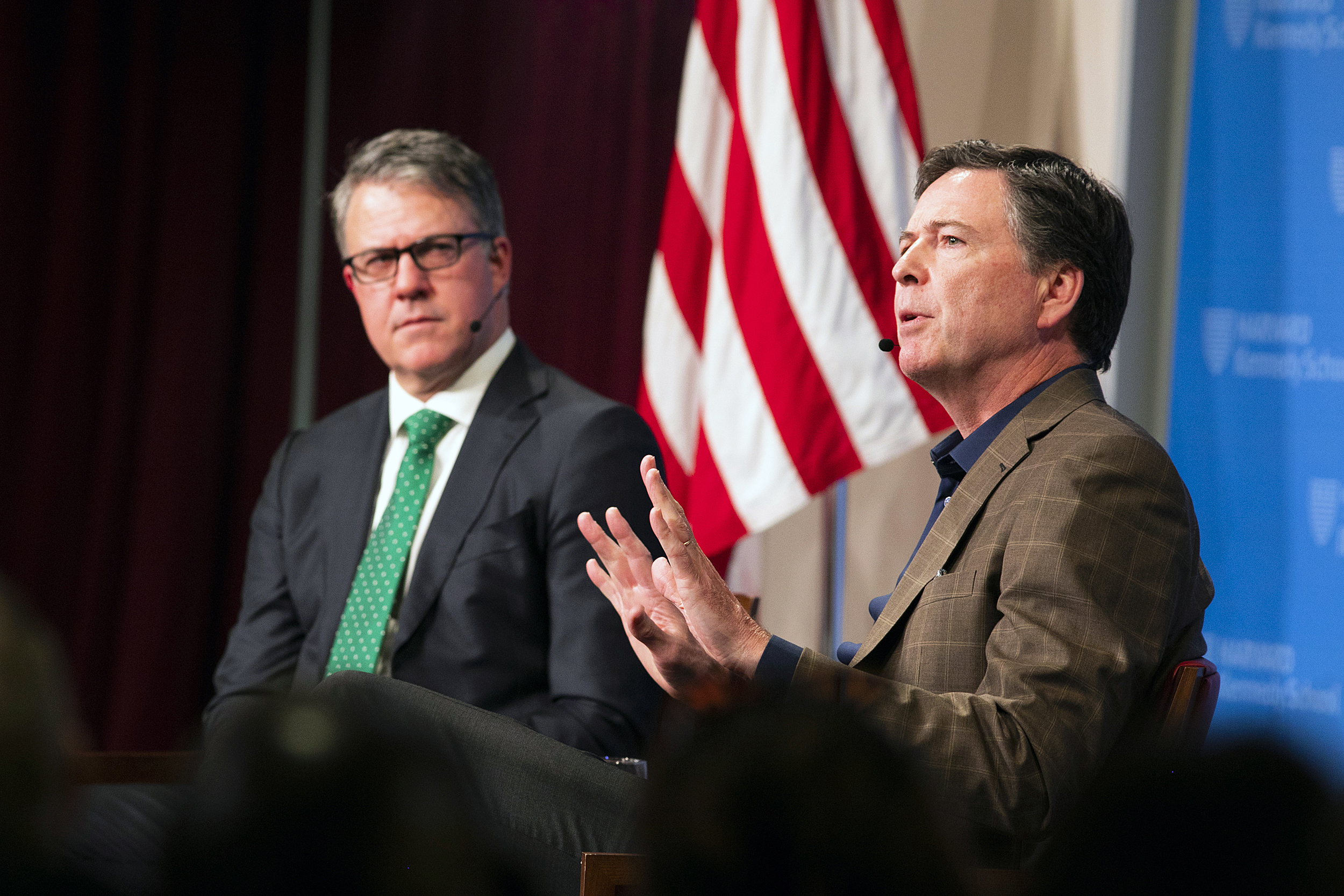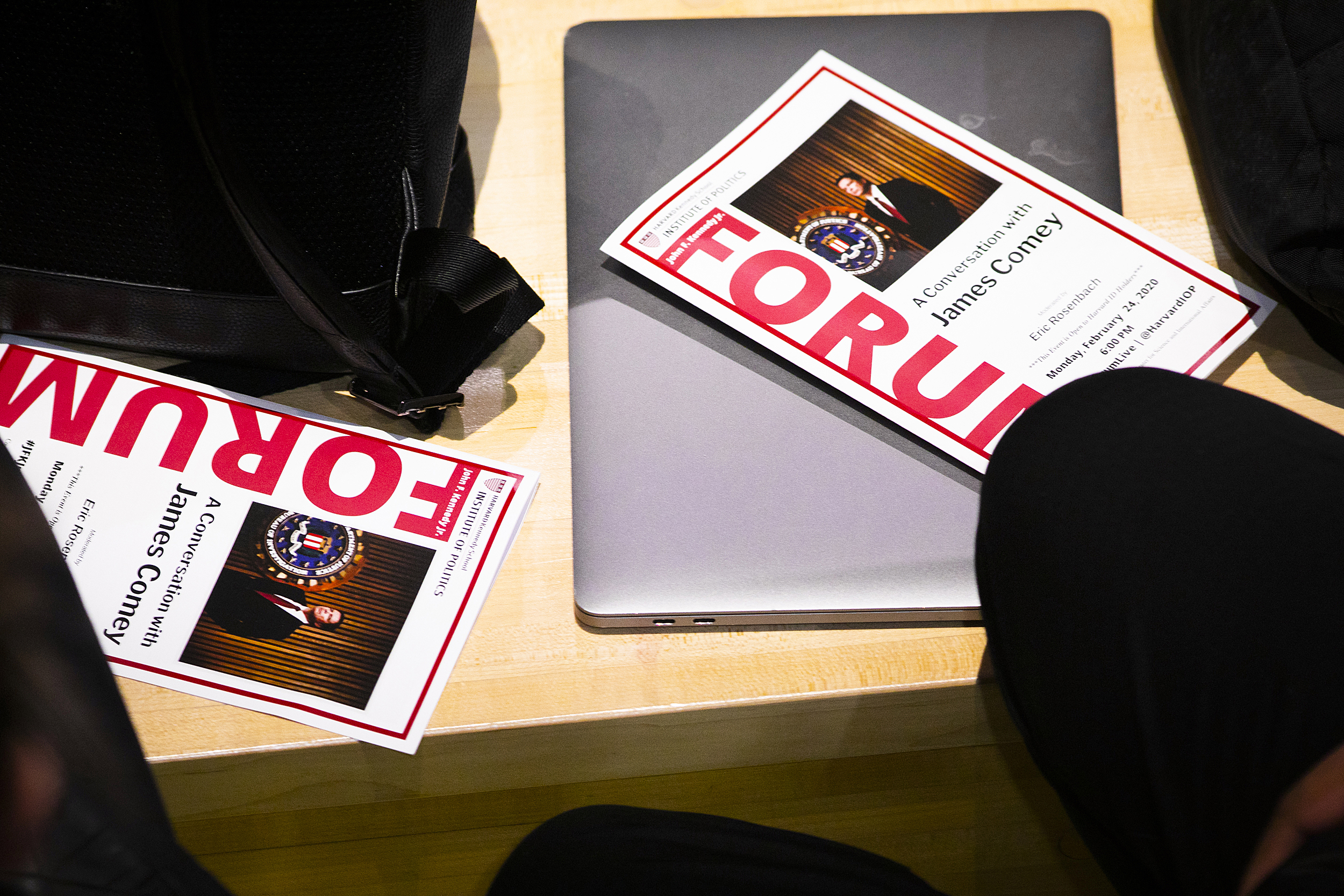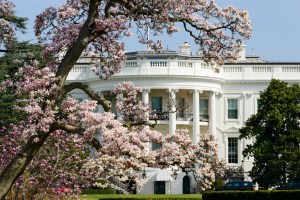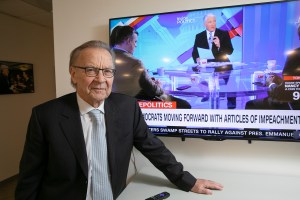
Former FBI Director James Comey (left) speaks with Eric Rosenbach at the John F. Kennedy Jr. Forum at Harvard Kennedy School.
Photos by Stephanie Mitchell/Harvard Staff Photographer
Comey defends ‘nightmare I can’t awaken from’
In Kennedy School appearance, former FBI director revisits his decisions during 2016 presidential election
The 2020 election is just eight months away, U.S. intelligence says Russia is again trying to influence the outcome, and the president is ousting senior justice, national security, and intelligence officials in favor of political loyalists.
Yet it was the FBI’s investigation in 2016 into Hillary Clinton’s handling of classified emails and the Trump campaign’s alleged coordination with Russia during the election that audience members couldn’t hear enough about from James Comey, the former FBI director, during an Institute of Politics talk Monday evening at Harvard Kennedy School’s JFK Jr. Forum.
Moderator Eric Rosenbach, M.P.P. ’04, a former cyber expert at the Pentagon and former chief of staff to Secretary of Defense Ash Carter from 2015 to 2017, pressed Comey to explain to the capacity crowd why the bureau’s Trump campaign probe, which began in late July 2016, was kept secret from voters while Comey reported on the Clinton inquiry’s status that same month and again in late October that year.
Calling that episode “a nightmare I can’t awaken from,” Comey nevertheless defended his decision, saying the cases were at different stages that July. Clinton’s case had been public since 2015, while Trump’s was in its earliest days and did not yet involve the candidate.
Though he knows that Clinton wrote in her memoir that Comey “shivved” her by going public with his concerns on Oct. 28 and that he has caused Clinton supporters, including his wife, “a lot of pain,” Comey said he would not apologize to her because he never intended to help or hurt her campaign. He said his motivation was simply to be transparent in order to maintain public faith in the FBI.
“I knew I was totally screwed,” he said of his decision. “Personally, it was disastrous for me. A lot of people don’t like me. OK, but at the end of my life, I’m going to tell my grandchildren … ‘Here’s what I did and why.’ And I’m really comfortable with that.”

Rosenbach, now co-director of the Belfer Center for Science and International Affairs, questioned Comey about two Department of Justice watchdog reports issued since President Trump dismissed Comey in May 2017. The DOJ reports criticized Comey’s decision-making during the 2016 election and found significant errors in the FBI’s handling of a surveillance-warrant application for a Trump associate in late 2016 under the Foreign Intelligence Surveillance Act (FISA).
Though DOJ’s Office of the Inspector General (OIG) admonished Comey for deviating from standard departmental practices and protocols, the 2018 report concluded that politics had not played a role in his actions.
The problems uncovered in the OIG’s December 2019 report on the FBI’s FISA warrant “have to be dug into,” Comey said, though he added it’s a multi-layered, rigorous system and the FBI director’s role in the application process was “quite limited.” Congress is scheduled to consider reauthorizing the FISA law next month. Though the application system could be reformed, Comey said, retaining the capability is vital to national security. “We have to conduct it.”
In other areas, in the wake of last month’s arrest of Charles M. Lieber, chairman of Harvard’s Chemistry Department, on charges that he misled federal law enforcement about his ties to a Chinese government research program, Comey said academic communities need to become more aware of the threat posed by intellectual-property spies who use the openness and collaborative environment of universities as cover, and be a little less trusting and open. “Everyone’s not a friend,” he said.
Asked to advise students who want to go into government while embracing core values like truth and integrity and avoiding partisanship, Comey suggested they think about the long road ahead.
“Know that you will die someday,” and you may have to confront yourself or be questioned by children and grandchildren, “and you will explain yourself to them,” he said.
“I’m disgusted by a lot of what I see in public life today,” Comey added, particularly those now or formerly in positions of power who simply mutter, “‘I know what the president is doing is wrong, but I don’t want to say it.’ I wish they would embrace a little more of that perspective and stand up and do the right thing.”







